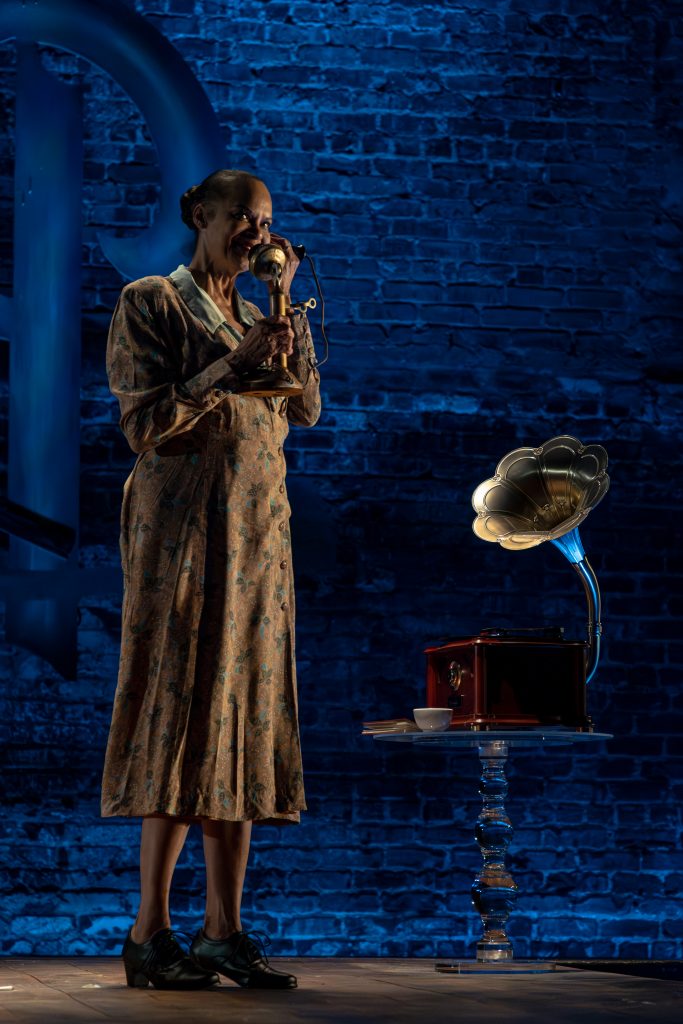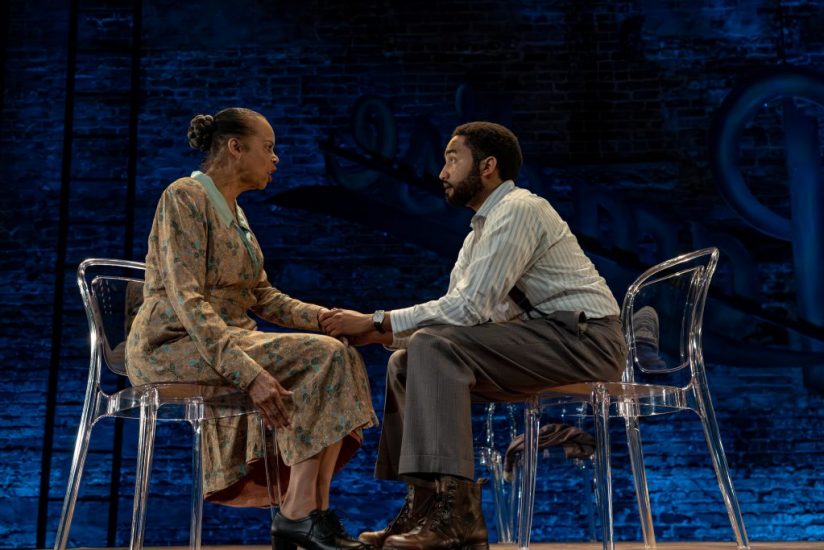“Love and Responsibility”: Terry Burrell and Stephen Ruffin on Why “The Glass Menagerie” Still Matters
For its 49th season opener, Theatrical Outfit has placed a powder keg on stage with its powerful new staging of playwright Tennessee Williams’ break-through Broadway hit “The Glass Menagerie.” Seeing Terry Burrell, Stephen Ruffin, Devon Hales and Matt Mercurio inhabit these desperate, longing and loving characters as they navigate nightly through the trauma of The Great Depression is both moving and affecting. First produced under his birth name, Thomas Lanier Williams III in 1944, “The Glass Menagerie” is as TO dramaturg Addae Moon describes it “a deeply autobiographical exorcism.” Like the character of Tom, Williams was a young writer “trapped between obligation and ambition” and the play’s sister Laura is closely based on his own sister Rose, who would be diagnosed with schizophrenia and later institutionalized. The play’s steely matriarch Amanda Wingfield is based on the playwright’s own complicated relationship with his mother Edwina.
It’s the powerhouse pairing of veteran Atlanta stage actress Terry Burrell (who played Billie Holiday onstage at Theatrical Outfit “Lady Day at Emerson’s Bar and Grill” in 2018 and 2022) as Amanda and Stephen Ruffin (seen in last season’s TO production of “A Raisin in the Sun” and the John Singleton-created FX drama series “Snowfall”) as her dutiful son Tom that ignites this production.
In a conversation with Eldredge ATL, Burrell and Ruffin discuss their onstage chemistry, tackling Williams’ iconic monologues and why the 80-year-old American classic continues to resonate with audiences, especially now. This interview has been edited for length and clarity.

Q: What attracted each of you to this new staging?
Terry Burrell: First, it was Theatrical Outfit that asked and I love the work that they do. It’s also a classic. I had no pretense that I was just going to ace this. For starters, it’s thousands of words. It’s a lot of text and then you dig into that text and you see how complicated this woman is. People kept describing her as “monstrous” which is interesting because I never thought of her that way. She’s just very practical and pragmatic about what she needs to do.
Stephen Ruffin: Most theatre people have some sort of significant experience with the piece, whether they played it in high school or it was the first play they read or for [director and TO artistic director] Matt [Torney], his mother played Amanda the first time he saw it. Everyone has really strong connections to the play and I really didn’t have one. During my acting training in school I somehow missed it. I came quite cold to it, which was nice. I still have seen no versions of it. If I tackle a role, I prefer not to see how other people do it and that’s rare when you’re doing a classic. I knew I would be able to attack this with the fresh new lenses that Matt wanted. I felt like I was able to bring a lot of myself and a lot of the turmoil that Williams was processing at the time. It was artistically enticing and once I was in the room doing the callback with Terry, it was a no-brainer. Like every other actor in Atlanta, I’ve wanted to work onstage with Terry for a long time.
Burrell: After the callback, we went out and had coffee together because we didn’t really know each other outside of seeing each other’s work. It’s just so easy with Stephen. Whatever he feeds me, I can go with it. And that’s how it is onstage every night. One of the things I noticed about Stephen, Devon and Matt is they listen. And that’s the mark of a really, really good actor. You’re not going to deliver the lines the same way every single time.
Ruffin: You can’t.
Burrell: Especially when you become more and more relaxed with the piece. I remember saying to Stephen backstage one night, “I’ve got something special for your behind tonight!”
Ruffin: (laughs). That’s not exactly the word she used but we’ll stick with that. The audience isn’t paying for animatronics, they’re paying for lightning in a bottle so we have to bring that. It helps that we’re working with Devon and Matt, two of the best actors on the planet. It makes it easy for all of us to be on our toes, fully listening and ready to cook the meal using the ingredients we’re given every night. The audience is the biggest ingredient and it changes each night and we’ve got to cook that fresh meal for them and sometimes we need to adapt the recipe.
Q: Terry, on “Good Day Atlanta” you said you saw aspects of yourself in Amanda. What was relatable for you?
Burrell: We share a love of family. Her husband has deserted them and she has to ask herself, “How do we fix this?” Her young son is working in a factory and he’s been there long enough to really chafe. It’s not that she doesn’t understand. She does understand his struggle but she also understands the reality of having to eat and keep the lights on. I’m very much like that. I’m very strong and very centered in my opinion of and my view of things. There is a lot of me in Amanda.

Q: Stephen, as a young writer, Tom is a thinly veiled version of Williams. Sometimes, sitting in the audience the monologues he wrote for Tom physically hurt knowing he was pouring all of this autobiography onto the stage. What’s it been like for you also as a young ambitious person playing a guy who has put his dreams into the backseat for his family?
Ruffin: There are a lot of things about Tom that I don’t end up agreeing with or understanding. But what I can understand quite well is feeling like the things you dreamed about so vividly as a kid and then finding out that the world you live in, the country you live in doesn’t work that way. I know what it is to be a person who has to make large sacrifices. I know what it feels like to be viciously unsupported by the system. As a father, I now also understand what it is to balance responsibility and dreams. There’s so much poetry in Williams’ words but when he wrote this play his name was still Thomas. He became Tennessee after this work made him famous. You can feel Thomas Williams’ raw, tortured human and his dedicated, loyal survivalist spirit throughout the piece. It’s a gift to dig into. Those monologues are gorgeous and require such truthfulness in the moment that’s both a challenge and a joy to get to do.
Q: This is a very old play that has been done a billion times. Why does this story matter right now?
Ruffin: The theatre can do something specific in the telling of story. Tennessee Williams, his original version of the play which was produced in Chicago, had all sorts of strange dream-like sequences they cut out for the Broadway production. He wanted this to be a theatrical experience. It’s set during the depression just before World War II, a large shifting moment in American history. Lots of governmental change, lots of social change are occurring. This November, this Thanksgiving, a lot of people are going to go to dinner tables where the truth of what they want is not safe. A table where what is happening in our country and our world aren’t safe to talk about with the people they are closest to on the planet. I think that’s what this piece is about. This is also a piece about love and social responsibility and that’s why this piece is timeless. You’ll watch moments and see your mom, your brother, your sister and your high school best friend and we’re the mirror.

Burrell: It always surprises me after the show when people I don’t know come up to me and are triggered by what they’ve watched onstage.
Ruffin: And touched, right?
Burrell: That’s right. Black, white, male, female, it doesn’t matter. Sometimes they just cry while they’re talking to me. It’s that human element, more than anything else, that’s at the core of this play and how that affects everything around you, especially with what is happening today. I don’t know what supports Amanda had in place to help her with her children. It doesn’t sound like she had much. When there’s a depression, everyone is affected.
Ruffin: There’s a reason why Amanda’s 24-year-old son has been working in a warehouse for 10 years and maintaining the family on one income. They’re not set up for success and Tom believes he’s been swindled by society into being relegated into this position which is something a lot of people feel right now.
Burrell: I stand on that stage at the top of the show every night and I’m thinking to myself this is a woman who doesn’t have the money to buy meat for the family dinner table. She’s struggling just to afford a head of cabbage. We’re performing this piece at a time when air traffic controllers are having to take on a second job to put food on the table. I have never lived in a time when our government deliberately starved its own people. It’s impossible not to bring that on stage with you each night. These realities still exist. That’s the power of this play. That’s why it’s an American classic.
Tennessee Williams’ “The Glass Menagerie” Starring Terry Burrell, Devon Hales, Matt Mercurio and Stephen Ruffin opens the 49th season of Theatrical Outfit on the Balzer Theatre at Herren’s stage through Nov. 23 at 84 Luckie St. NW Atlanta downtown. For tickets visit theatricaloutfit.org or call: 678-528-1500.
Above images by Casey G Ford and courtesy of Theatrical Outfit.

Richard L. Eldredge is the founder and editor in chief of Eldredge ATL. As a reporter for the Atlanta Journal-Constitution and Atlanta magazine, he has covered Atlanta since 1990.




